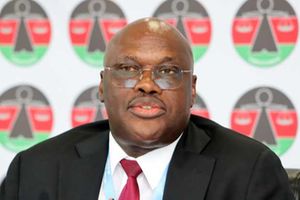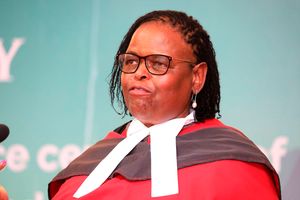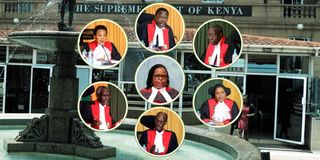
Chief Justice Martha Koome (center) and Supreme Court judges (top clockwise) Dr Smokin Wanjala, William Ouko, Njoki Ndung'u, Mohamed Ibrahim, Isaac Lenaola and Philomena Mwilu.
The High Court is set to deal with ten key questions that will determine the fate of the Supreme Court judges, including Chief Justice Martha Koome, in their battle with the Judicial Service Commission (JSC) over their proposed removal from office.
A perusal of the nine petitions filed at the High Court in Milimani Nairobi and Narok by the judges and citizen named Pariken Ole Esho indicates that the ten fundamental questions have the potential of quashing or ratifying the disciplinary proceedings.
The nine petitions were lodged through eight law firms.
Among the key questions emerging from the petitions is whether the JSC has oversight authority on the Supreme Court.
According to CJ Koome, the JSC does not have ultimate powers to oversight the Supreme Court.
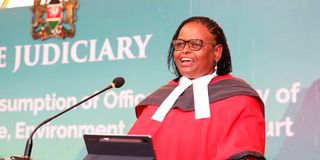
Chief Justice Martha Koome.
"Indeed, it is the Supreme Court which has ultimate authority over the JSC on matters of removal of judges of superior courts from office. The Constitution does not contemplate any circumstances under which the Supreme Court can be subordinate to the JSC," says Ms Koome.
The second question is whether it was erroneous for JSC to commence ouster proceedings against the entire seven-judge bench.
The High Court will determine whether there was procedural impropriety and unreasonableness on the part of JSC.
Constitutional vacuum
The judges believe that removal of the entire bench or suspension of the same pending outcome of the tribunal's trial will create a Constitutional vacuum and crisis in the Judiciary leadership.
The third fundamental question concern the decision of the JSC to admit the complaints lodged against the judges collectively and not individually.
Ms Koome and the judges have stated that the Constitution says the power of JSC is on removal of a 'judge' from office not 'judges'.
The fourth question is on alleged impropriety of JSC's decision to allegedly announce to members of the public that there were complaints concerning removal of the Supreme judges from office before officially informing the concerned judges.
Accordance to the judges, the JSC press release dated January 16, 2025 was issued before the judges of the Supreme Court were officially notified of the petition, meaning the judges learned about the petition through the media rather than the formal communication.
"This public ambush subjected the judges to trial by public opinion, damaging their dignity, integrity and professional standing before they even had the opportunity to respond to the claims against them," says Justice William Ouko.
The fifth question emerges from Justice Isaac Lenaola's petition, questioning whether a Supreme Judge can be subjected to disciplinary process over a ruling or judgement rendered by the court but which he or she was not involved in.
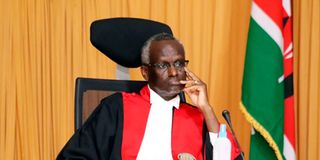
Justice Isaac Lenaola.
The question stems from the complaint filed by former Cabinet Minister Raphael Tuju's Dari Limited against the judges over the court's ruling in his financial dispute with the East African Development Bank.
Although Mr Lenaola is a defendant in the complaint, he says that he was not part of the bench and wants court to determine if there was impropriety on the part of JSC for asking him to respond to the complaint.
The sixth question is whether the JSC could use the Judicial Service (Processing of Petitions and Complaints Procedures) Regulations 2024 to process the complaints without having gazetted the said rules first.
According to the judges and Mr Ole Esho, the procedural rules are yet to be gazetted and the Commission had on December 10, 2024 invited members of the public to submit views on the draft document.
"The absence of clear procedural rules within the JSC for handling complaints against judges in such circumstances creates a risk of arbitrary and unfair administrative actions," says Mr Ole Esho in his Judicial Review case.
Judicial independence
The seventh question concerns the alleged violation of doctrine of judicial independence by JSC, applicability of the sub-judice rule and whether JSC can process a complaint concerning a case which is pending in another court.
The judges believe the JSC proceedings are sub-judicial since the complaints that led to the discipline proceedings touch on issues subject to four ongoing cases at the High Court, Court of Appeal, Supreme Court and East African Court of Justice.
“The continuation of the proceedings before the JSC poses an imminent risk of irreparable harm and infringement of the judges' rights and inflicting irreversible damage on their professional reputation and the integrity of the Judiciary,” said Justice Njoki Ndung'u.
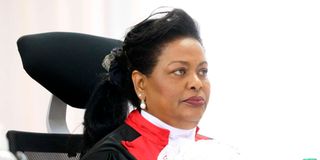
Justice Njoki Ndung'u.
The eighth question emerges from the petition of Justice Mohammed Ibrahim, who wants court to determine whether there can be a joint or collective misconduct of judges.
He states that, by its very nature, gross misconduct cannot be joint and collective and it can only be attributed to a single judge.
"The JSC petition does not in any way whatsoever particularize any grounds on which the complainant wants the judge removed from office," said Justice Ibrahim.

Justice Mohammed K Ibrahim.
The ninth question is whether JSC failed in its duty to protect the judges by allowing accusations of bribery and corruption against the Supreme judges to continue flying in social media without the accusers identifying any individual. The judges are angry that the Commission proceeded to ask the judges to respond to the said accusations.
"By allowing such general and unsubstantiated allegations to fly and requesting me to respond to the same, the JSC abrogated my right to fair hearing as enshrined in Article 50 of the Constitution, which requires that I be informed of the allegations levelled against me with sufficient detail and that the evidence, to be relied on in proving the said allegations, availed to me so that I can prepare sufficient response," says Deputy Chief Justice Philomena Mwilu.
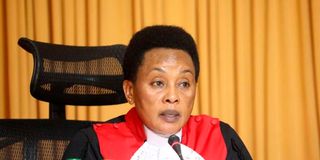
Deputy Chief Justice Philomena Mwilu.
The tenth key question is whether a Supreme Judge can be removed from office based on collegial decisions of the entire Supreme Court.
"The architecture of Article 168 of the Constitution only gives the JSC the mandate to initiate the removal of a judge from office on account of his/her individual and personal culpability," says Ms Mwilu in her petition.
The JSC has already halted the disciplinary proceedings and vowed to challenge the interim orders issued by the High Court to suspend the exercise pending determination of the judges' application.

